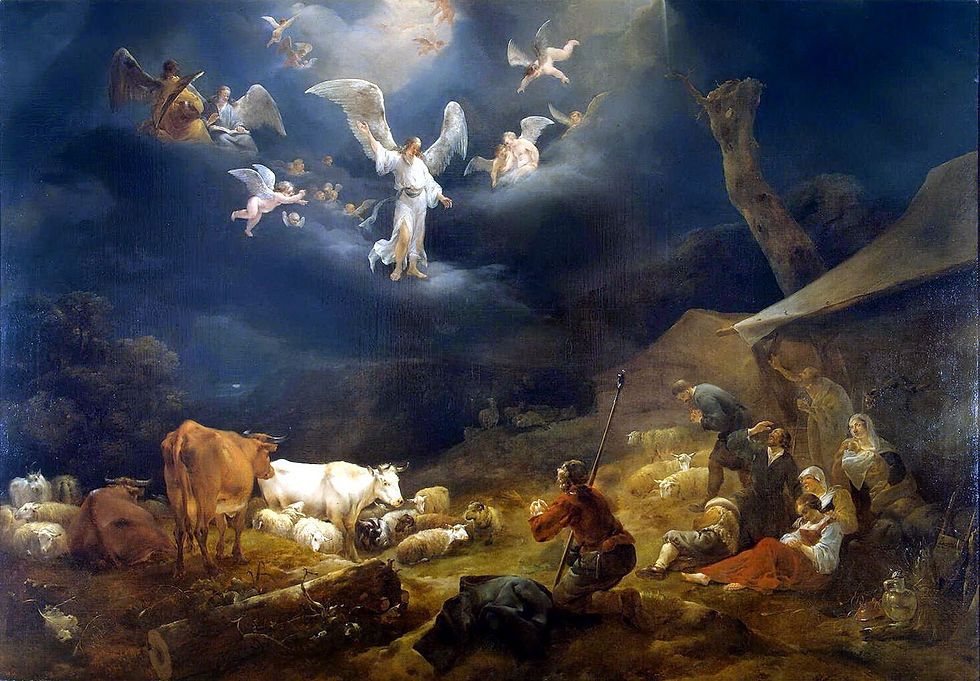Only One Person Must Compare Ourselves To
- Drew M Christian

- Mar 18, 2025
- 4 min read
March 19, 2025
Only One Person Must Compare Ourselves To
March 19, 2025
Studies consistently reveal that one of the greatest dangers of social media is comparison. When we measure our lives against others and perceive ourselves as less than, it can negatively impact our mental health, leading to feelings of inadequacy, low self-esteem, and even contributing to depression, anxiety, or eating disorders. On the other hand, when we see ourselves as better than others, comparison can distort our relationship with God, hindering our humility and recognition of our need for a Savior.
Let’s take a moment to focus on the latter. We often hear news reports about people committing crimes or engaging in immoral behavior. We overhear gossip about the person sitting across the pew or the neighbor down the street. In comparison, we might feel pretty good about ourselves, especially when someone else’s “dirty laundry” is on full display. “At least we’re not doing that,” we reassure ourselves.
But there is only one person we must compare ourselves with and that is Jesus Christ. How do our actions, our speech, our thoughts, our relationships, our business practices, line up with Christ’s teachings, with the way He lived?
Jesus tells a parable concerning two men who went up to the Temple to pray. One of these men was a Pharisee and the other was a Tax Collector.
Pharisees were a group of particularly observant and legalistic Jews, who observed ritual purity, tithing, and fasting, as well as interpreted biblical law. They were the religious leaders of the day, the priests, holy men.
Tax Collectors (or Publicans) were despised by the Jewish people because they were Jews who worked for the oppressive Romans collecting taxes; therefore, they were seen as turncoats or traitors to their own countrymen. Furthermore, they were known for cheating the people they collected from by skimming off the top, leading to tax collectors becoming wealthy which separated them even more from their lower-class Jewish brothers and sisters.
These two men come into the Temple to pray. The Pharisee stood and prayed, “God, I thank you that I am not like other people—robbers, evildoers, adulterers—or even like this tax collector. I fast twice a week and give a tenth of all I get” (Luke 18:11-12). It is important that we remember that the Pharisee is not a villain. He believes in God and acts on his faith by fasting and tithing and praying in the Temple. The Pharisee’s sin is pride.
Jesus then contrasts the Tax Collector’s stance and attitude in prayer to the Pharisee’s. Jesus describes, “But the tax collector stood at a distance. He would not even look up to heaven, but beat his breast and said, ‘God, have mercy on me, a sinner’” (Luke 18:13). The Tax Collector, though not a holy man, and considered by many to be a cheat and a traitor, shows humility before God.
Jesus tells those listening, “I tell you that this man, rather than the other, went home justified before God. For all those who exalt themselves will be humbled, and those who humble themselves will be exalted” (Luke 18:14).
Warren W. Wiersbe writes, “The Pharisee’s pride condemned him, but the Publican’s humble faith saved him.” Once more the paradox of humbleness is illuminated.
In this story, many of us see ourselves as the Tax Collector, not the arrogant Pharisee. It is important to understand that just by connecting ourselves, in our minds, with the humble Tax Collector, we are falling prey to the same sin the Pharisee exhibits in his prayer…pride.
We see the same lesson in Jesus’ Parable of the Prodigal Son.
The younger son, who squandered his inheritance on wild living, returned home and was met by his father with a celebration. The older son was angry that his brother would receive a party after leaving his family and wasting his inheritance, while he received nothing even though he stayed with his family and worked on the farm faithfully. The older son is comparing himself to his younger brother and in his mind comes across as the better of the two sons. By comparing himself to his younger brother he cannot see his own sins, faults, and shortcomings.
When we compare ourselves to others we fail to see our own sin. Remember, as Paul writes, “For all have sinned and fallen short of the glory of God” (Romans 3:23).
If we fail to see ourselves in the light of Christ, we fail to see where we fall “short of the glory of God” and therefore, fail to see our need for a Savior.
God’s Word tells us, when we compare ourselves to Christ, when we go to Him, that “everything exposed by the light becomes visible” (Ephesians 5:13). We can buy “gold refined by fire,” “white garments, that [we] may be clothed,” and “anoint [our] eyes with eye salve, that [we] may see” (Revelation 3:18).
When we shift our focus from comparing ourselves to others and instead measure our lives against Christ, we gain a true understanding of our spiritual condition. Only in His light do we see our need for grace, redemption, and transformation. The Pharisee’s pride blinded him to his need for mercy, while the tax collector’s humility opened the door for God’s forgiveness. Likewise, the older brother in the parable of The Prodigal Son was so consumed with comparison that he missed the beauty of grace freely given. Let us not fall into the trap of pride or self-righteousness, but instead approach God with humble hearts, seeking to be transformed into the likeness of Christ.



Comments